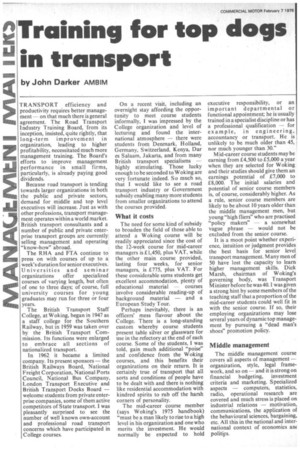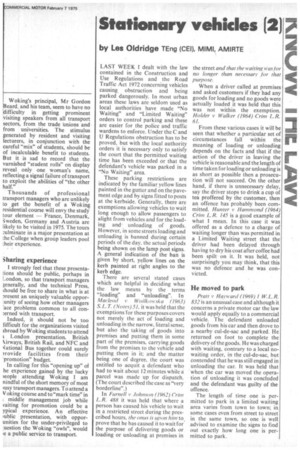Training for top dogs in transport
Page 76

Page 77

If you've noticed an error in this article please click here to report it so we can fix it.
by John Darker AMBIM
TRANSPORT efficiency and productivity requires better management — on that much there is general agreement. The Road Transport Industry Training Board, from its inception, insisted, quite rightly, that long-term improvement in organization, leading to higher profitability, necessitated much more management training. The Board's efforts to improve management performance in small firms, particularly, is already paying good dividends.
Because road transport is tending towards larger organizations in both the public and private sectors, demand for middle and top level executives will increase. Just as with other professions, transport management operates within a world market. British transport consultants and a number of public and private enterprise transport groups are currently selling management and operating "know-how" abroad.
The RHA and FTA continue to press on with courses of up to a' week's duration for senior executives. Universities and seminar organizations offer specialized courses of varying length, but often of one to three days; of course, full university courses for young graduates may run for three or four years.
The British Transport Staff College, at Woking, began in 1947 as a staff college for the Southern Railway, but in 1959 was taken over by the British Transport Commission. Its functions were enlarged to embrace all sections of nationalized transport.
In 1962. it became a limited company. Its present sponsors — the British Railways Board, National Freight Corporation, National Ports Council, National Bus Company, London Transport Executive and British Transport Docks Board — welcome students from private enterprise companies, some of them active competitors of State transport. I was pleasantly surprised to see the number of well known own-account and professional road transport concerns which have participated in College courses. On a recent visit, including an overnight stay affording the opportunity to meet course students informally, I was impressed by the College organization and level of lecturing and found the international atmosphere — there were students from Denmark, Holland, Germany, Switzerland, Kenya, Dar es Salaam, Jakarta, and from many British transport specialisms — highly stimulating. Those lucky enough to be seconded to Woking are very fortunate indeed. So much so, that I would like to see a road transport industry or Government subsidy enabling many more students from smaller organizations to attend the courses provided.
What it costs The need for some kind of subsidy to broaden the field of those able to attend a Woking course will be readily appreciated since the cost of the 12-week course for mid-career managers is £1,450, plus VAT, while the other main course provided, lasting four weeks, for senior managers, is £775, plus VAT. For these considerable sums students get excellent accommodation, plenty of educational material — courses involve considerable reading-up of background material — and a European Study Tour.
Perhaps inevitably, there is an officers' mess flavour about the College. There is a long-standing custom whereby course students present table silver or glassware for use in the refectory at the end of each course. Some of the students, I was told, gain much additional "poise" and confidence from the Woking courses, and this benefits their organizations on their return. It is certainly true of transport that all sorts and conditions of people have to be dealt with and there is nothing like residential accommodation with kindred spirits to rub off the harsh corners of personality.
The mid-career course member (says Woking's 1975 handbook) "must be a man likely to rise to a high level in his organization and one who merits the investment. He would normally be expected to hold executive responsibility, or an important departmental or functional appointment; he is usually trained in a specialist discipline or has a professional qualification — for example, in engineering, accountancy or transport. He is unlikely to be. much older than 45, nor much younger than 30."
Mid-career course students may be earning from £4,500 to £5,000 a year when they are selected for Woking and their studies should give them an earnings potential of £7,000 to £8,000. The initial salaries and potential of senior course members is, of course, considerably higher. As a rule, senior course members are likely to be about 10 years older than the middle management men, but young "high fliers" who are practised "policy makers" -a somewhat vague phrase — would not be excluded from the senior course.
It is a moot point whether experience, intuition or judgment provides the best basis for senior level transport management. Many men of 50 have lost the capacity to learn higher management skills. Dick Marsh, chairman of Woking's governing body, was Transport Minister before he was 40.1 was given a strong hint by some members of the teaching staff that a proportion of the mid-career students could well fit in with the senior course. If so, their employing organizations may lose several years of dynamic top management by pursuing a "dead man's shoes" promotion policy.
Middle management
The middle management course covers all aspects of management — organization, style, legal framework, and so on — and it is strong on financial budgeting, investment criteria and marketing. Specialized aspects — computers, statistics, radio, operational research are covered and much stress is placed on industrial relations — motivation, communications, the application of the behavioural sciences, bargaining, etc. All this in the national and international context of economics ant Woking's principal, Mr Gordon 'Beard, and his team, seem to have no difficulty in getting prominent visiting speakers from all transport sectors, from the trade Unions and from universities. The stimulus generated by resident and visiting lecturers, in conjunction with the careful "mix" of students, should be of incalculable benefit to students. But it is sad to record that the varnished "student rolls" on display reveal only one woman's name, reflecting a signal failure of transport to exploit the abilities of "the other half."
Thousands of professional transport managers who are unlikely to get the benefit of a Woking residential course will envy the study tour element — France, Denmark, 3weden, Germany and Austria are likely to be visited in 1975. The tours ,..ulminate in a major presentation at the College when group leaders pool :heir experience.
;haring experience I strongly feel that these presentations should be public, perhaps in London, so that transport managers generally, and the technical Press, thould be free to share in what is at lresent an uniquely valuable oppor:unity of seeing how other managers 'ace problems common to all con:timed with transport.
Indeed, it should not be too lifficult for the organizations visited ibroad by Woking students to attend t London presentation. British kirways, British Rail, and NFC and sTational Bus together could surely novide facilities from their 'promotion" budget.
In calling for this "opening up" of he experience gained by the lucky )eople attending Woking I am nindful of the short memory of most msy transport managers. To attend a V oking course and to"mark time" in middle management job while vaiting for promotion could be a ypical experience. An effective lublic presentation, with opporunities for the under-privileged to uestion the Woking "owls", would ,e a public service to transport.












































































































































